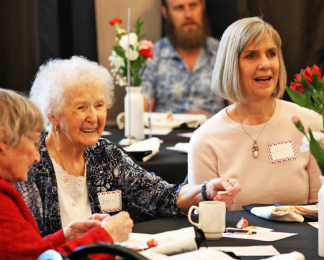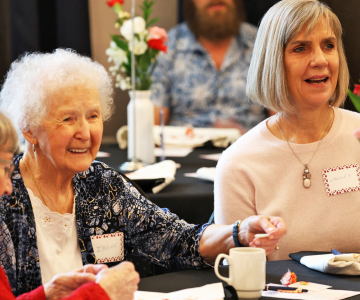As the snow falls, and we prepare to enjoy our favorite winter activities, it is important to remain prepared and stay protected from risky weather situations. There's always potential for freezing cold temperatures in the winter. Here's what you can do to ensure you and your family remain safe and healthy.
Tips to stay protected from the dropping temperatures this winter


Stay informed
Sign-up to receive news and alert posts from Interior Health, right to your inbox.
You can also receive weather alerts and updates on the Government of Canada’s weather alerts.
Review the Government of BC's information on preparing for winter weather.
Seek shelter
It is important to know about different resources that are available. If you, or someone you know, needs to find shelter from the outside conditions, you can access services through your community municipality. Check out the BC Housing shelter locations or view the BC Emergency information interactive map.
Protect yourself outside
While preparing to go out and about, or during your winter activities, you may want to keep these tips in mind.
- Bring an emergency kit if you are going into the backcountry so you're prepared for conditions.
- During extreme weather head for shelter that will protect from cold, wind and snow/rain.
- Avoid too much activity and sweating.
- Avoid touching metal.
- Eat and drink water.
- Avoid alcohol, caffeine and nicotine.
- Wear proper clothing and keep hands and feet dry. Mittens are better than gloves at keeping hands warm and dry.
- Wear glasses or goggles during outdoor activities.
Watch for those who are vulnerable. Keep an eye out for community members, especially the unhoused population, who may be underdressed for the weather and/or looking unwell. If you see someone experiencing severe cold injuries, start warming them up right away and dial 9-1-1, or take them to the nearest emergency department immediately.
Cold injures and symptoms
Exposure to cold weather can lead to injury or worse. Risk is especially high for people who are very young, seniors, the unhoused community or those who are not warmly dressed for the weather.
The main cold injuries include:
- Frostbite
- Hypothermia
Watch for those who are vulnerable, especially the unhoused population. Keep an eye out for community members who may ne under dressed for the weather and/or looking unwell.
Frostbite
Frostbite is when your body is exposed to the cold for a long period of time, restricting blood flow to your hands, feet, nose, and ears.
Symptoms of frostbite
- Skin can look yellowish or white, but it is still soft to the touch.
- In severe cases, skin may be more discolored or turning black.
- You may experience loss of sensation and see blistering.
Hypothermia
Hypothermia is an abnormally low body temperature.
Symptoms of hypothermia
- Decreased body temperature
- Shivering
- Clumsy movements or speech
- Lack of concern
- Poor judgement
- Cold, pale or blue-grey skin
- Confusion
- Loss of consciousness
Tips to warm up
If you, or someone you know, are experiencing frostbite or hypothermia it is important to warm up quickly and effectively. Here are some ways to increase your body temperature.
- Keep your muscles moving.
- Remove any wet clothing.
- Warm the center of the body first.
- Drink warm beverages.
- Move to a warm room.
- Wrap yourself in blankets or reheat your body by skin-to-skin contact with another person.
- Don't fight shivering, this is one of the ways your body increases its core temperature.
Learn more at the Interior Health Cold Weather webpage.
Resources
Preparation to cold weather
- BC Gov news | People encouraged to prepare for winter weather
- PreparedBC – Severe Weather Checklist
- RoadSafetyBC – Preparing Your Vehicle
- Supporting People Experiencing Homelessness
Health and cold related injuries
- Your health this winter | HealthLinkBC
- Cold Temperature Exposure | HealthLink BC
- Health Canada – Health Risks of Extreme Cold
Shelters


Helping others navigate through some of the trials and tribulations of life is at the heart of Thandazani Mhlanga’s work as spiritual health practitioner at CMH
/stories/we-are-ih-spiritual-health-practitioner-encourages-connection


Every 30 minutes, one older adult in B.C. is hospitalized for fall-related injuries. But falls aren't an inevitable part of aging, & many falls are preventable.
/stories/preventing-falls-could-save-older-adults-life


Canada's Top 100 Employers recognizes organizations that lead their industries in offering exceptional workplaces for employees. Find out why IH was chosen.
/stories/interior-health-named-one-canadas-top-100-employers-2025


Let’s meet some NPs who are providing patient focused, compassionate care, that improves the health and well-being of patients in the communities they serve.
/stories/we-are-ih-nurse-practitioners-positively-impact-patients-lives


The Interior Health (IH) Legal Substances Team and the YOUTHWISE Advisory Group are excited to launch IH’s annual youth poster contest
/stories/contest-seeks-youth-views-tobacco-cannabis-vaping-alcohol


Created out of a desire to provide practical content to new nurses, the New to Nursing podcast aims to empower graduates transitioning out of the classroom.
/stories/new-nursing-podcast-offers-advice-stories-expert-insights
STAY CONNECTED
Receive news and alert posts, and Stories@IH blog posts, right to your inbox!
